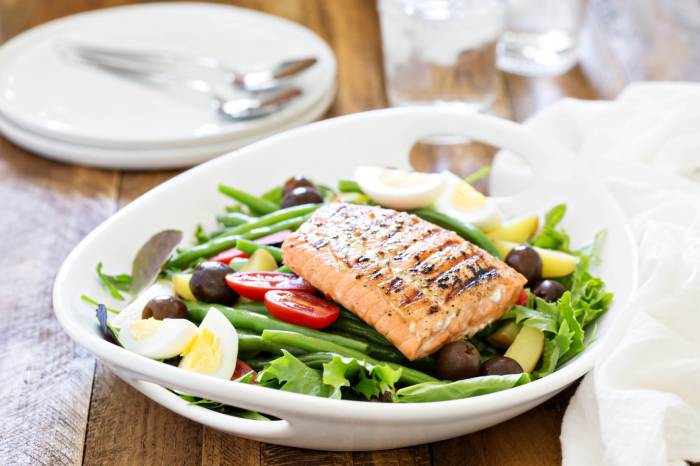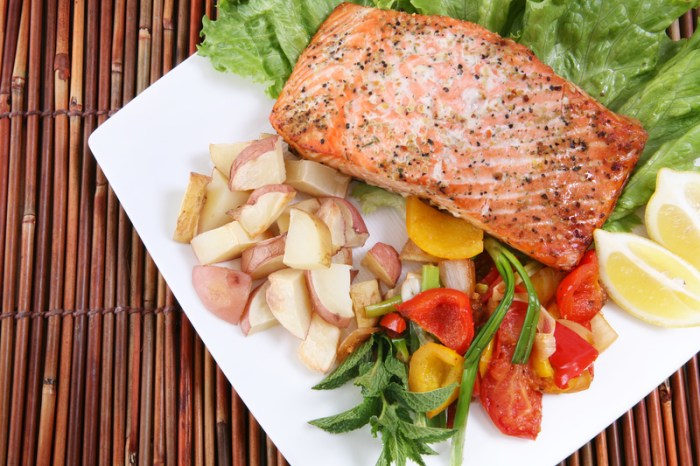What is a pesco vegetarian? This unique dietary approach combines elements of vegetarianism and pescatarianism, offering a distinct set of food choices, nutritional considerations, and ethical implications. Join us as we delve into the world of pesco vegetarianism, exploring its nuances and uncovering its potential benefits and challenges.
As a pesco vegetarian, one adheres to a diet that excludes meat and poultry but embraces the consumption of fish and other seafood. This dietary choice often stems from ethical concerns about animal welfare or environmental sustainability, while also providing a rich source of omega-3 fatty acids and other nutrients found in fish.
Definition of Pesco Vegetarianism

Pesco vegetarianism, a variation of vegetarianism, involves the consumption of seafood (fish, shellfish, and other aquatic animals) while excluding other types of meat, such as poultry, red meat, and pork.
Pesco vegetarians typically adopt this dietary pattern for various reasons, including health benefits, ethical concerns, or personal preferences. They believe in the importance of a plant-based diet while incorporating the nutritional advantages of seafood.
Included Foods
- Fruits and vegetables
- Legumes and beans
- Nuts and seeds
- Whole grains
- Fish and shellfish
Excluded Foods
- Red meat (beef, lamb, pork)
- Poultry (chicken, turkey, duck)
- Dairy products (milk, cheese, yogurt)
- Eggs
Nutritional Considerations: What Is A Pesco Vegetarian

A pesco vegetarian diet can provide numerous nutritional benefits while also presenting certain limitations. Understanding the dietary implications is crucial for ensuring optimal health.
One of the primary benefits of a pesco vegetarian diet is its high protein content. Fish is a rich source of complete protein, providing all the essential amino acids required for bodily functions. However, it’s important to note that plant-based protein sources, such as legumes and tofu, are not as easily digestible as animal protein and may require supplementation.
Essential Vitamins and Minerals, What is a pesco vegetarian
- Vitamin B12:Found exclusively in animal products, Vitamin B12 is essential for red blood cell formation and neurological function. Pesco vegetarians can obtain this vitamin from fish and seafood.
- Iron:Iron is necessary for oxygen transport throughout the body. While plant-based foods contain iron, it is less easily absorbed than heme iron found in meat. Pesco vegetarians can supplement their iron intake through fish, lentils, and fortified foods.
- Omega-3 Fatty Acids:Omega-3 fatty acids are crucial for heart and brain health. Fish is an excellent source of these fatty acids, making pesco vegetarians less likely to develop cardiovascular diseases.
To ensure adequate nutrient consumption, pesco vegetarians should focus on a balanced diet that includes a variety of fruits, vegetables, whole grains, and legumes. Regular monitoring of vitamin B12 and iron levels is also recommended to prevent deficiencies.
Health Implications
A pesco vegetarian diet offers numerous health benefits, primarily due to the inclusion of fish, a rich source of omega-3 fatty acids. These essential fatty acids have been linked to a reduced risk of various chronic diseases.
Heart Health
Omega-3 fatty acids have been shown to lower blood pressure, reduce inflammation, and improve cholesterol levels. These effects contribute to a reduced risk of heart disease, the leading cause of death globally.
- Studies have demonstrated that people who consume fish regularly have a lower risk of heart attacks, strokes, and other cardiovascular events.
- Omega-3 fatty acids have anti-inflammatory properties that help reduce plaque buildup in arteries, preventing blockages and promoting blood flow.
Cancer Prevention
Certain types of cancer, such as prostate, colon, and breast cancer, may be less prevalent among pesco vegetarians. Omega-3 fatty acids have antioxidant and anti-inflammatory effects that may inhibit tumor growth and spread.
- Research suggests that omega-3 fatty acids can reduce inflammation, which is linked to an increased risk of cancer.
- Some studies have found an association between higher fish consumption and a lower risk of certain types of cancer.
Overall Health
In addition to heart and cancer benefits, a pesco vegetarian diet can contribute to overall well-being. Fish is a good source of protein, vitamins, and minerals, including vitamin D, vitamin B12, and iodine.
- Vitamin D is essential for bone health and immune function.
- Vitamin B12 is crucial for brain health and red blood cell production.
- Iodine is necessary for thyroid hormone production, which regulates metabolism and growth.
Ethical and Environmental Considerations
A pesco vegetarian diet raises ethical and environmental concerns related to fish consumption, fishing practices, and the sustainability of marine ecosystems.
Ethical Implications of Fish Consumption
The consumption of fish raises ethical questions regarding the sentience and well-being of these animals. Fish possess a complex nervous system and have been shown to experience pain and distress. Some argue that killing and consuming fish for food is morally problematic, similar to the consumption of other animals.
Impact of Fishing Practices on Marine Ecosystems
Fishing practices can have significant negative impacts on marine ecosystems. Overfishing, bycatch (the accidental capture of non-target species), and habitat destruction can lead to the depletion of fish populations, disruption of food chains, and damage to coral reefs and other marine habitats.
Environmental Sustainability of a Pesco Vegetarian Diet
Compared to other dietary choices, a pesco vegetarian diet can have a lower environmental impact. Fish production generally requires less land, water, and feed than the production of meat from terrestrial animals. However, the sustainability of a pesco vegetarian diet depends on the type of fish consumed, the fishing methods used, and the overall dietary pattern.
Differences from Other Diets
Pesco vegetarianism is distinct from other vegetarian and non-vegetarian diets in several ways. Here’s a comparative overview:
Food Choices
Pesco vegetarians consume fish and seafood in addition to plant-based foods. They exclude meat, poultry, and eggs from their diet. In contrast, vegetarians adhere to a plant-based diet that excludes all animal products, including fish and seafood. Non-vegetarians consume a wide range of animal products, including meat, poultry, fish, seafood, eggs, and dairy.
Nutritional Profiles
Pesco vegetarians generally have similar nutritional profiles to vegetarians. They consume high amounts of fruits, vegetables, whole grains, and legumes, which provide essential vitamins, minerals, and fiber. However, pesco vegetarians have an advantage over vegetarians in terms of omega-3 fatty acid intake, as fish is a rich source of these essential fatty acids.
Ethical Considerations
Pesco vegetarianism aligns with the ethical concerns of vegetarianism, such as reducing animal suffering and promoting environmental sustainability. However, the consumption of fish and seafood raises ethical questions about the welfare of marine animals. Non-vegetarians do not adhere to ethical considerations related to animal welfare.
Table of Key Differences
| Diet | Food Choices | Nutritional Profile | Ethical Considerations |
|---|---|---|---|
| Pesco Vegetarian | Plant-based foods + fish and seafood | High in fruits, vegetables, whole grains, legumes, and omega-3 fatty acids | Reduces animal suffering and promotes sustainability, but raises ethical concerns about marine animals |
| Vegetarian | Plant-based foods only | High in fruits, vegetables, whole grains, and legumes, but lower in omega-3 fatty acids | Reduces animal suffering and promotes sustainability |
| Non-Vegetarian | Meat, poultry, fish, seafood, eggs, dairy, and plant-based foods | Varies depending on individual dietary choices | Does not adhere to ethical considerations related to animal welfare |
Examples of Vegetarian and Non-Vegetarian Diets
Vegetarian diets:Lacto-vegetarian (includes dairy), ovo-vegetarian (includes eggs), lacto-ovo vegetarian (includes dairy and eggs), vegan (excludes all animal products).
Non-vegetarian diets:Paleo diet (emphasizes whole, unprocessed foods, including meat and seafood), Mediterranean diet (focuses on fruits, vegetables, whole grains, and olive oil, with moderate consumption of meat and seafood), flexitarian diet (primarily plant-based, with occasional consumption of meat and seafood).
Recipes and Meal Planning

Pesco vegetarians can enjoy a wide range of flavorful and nutritious meals that incorporate both fish and plant-based foods. Here are some popular pesco vegetarian recipes to get you started:
- Grilled Salmon with Roasted Vegetables:Salmon fillets grilled to perfection, paired with roasted vegetables such as broccoli, carrots, and zucchini.
- Tuna Salad with Mixed Greens:A classic tuna salad made with canned tuna, mayonnaise, celery, and onion, served over mixed greens.
- Vegetable Stir-Fry with Tofu and Shrimp:A colorful stir-fry featuring vegetables like broccoli, carrots, and snap peas, combined with tofu and shrimp.
- Lentil Soup with Smoked Trout:A hearty and flavorful soup made with lentils, vegetables, and smoked trout.
- Quinoa Salad with Grilled Shrimp and Avocado:A refreshing and satisfying salad with quinoa, grilled shrimp, avocado, and a light dressing.
When meal planning for a pesco vegetarian diet, it’s important to ensure a balance of nutrients, including protein, carbohydrates, and healthy fats. Here are some tips for creating a balanced pesco vegetarian meal plan:
- Include a variety of protein sources:Choose from fish, tofu, tempeh, beans, lentils, and nuts.
- Choose whole grains over refined grains:Opt for brown rice, quinoa, whole-wheat bread, and oatmeal.
- Incorporate plenty of fruits and vegetables:Aim for at least five servings per day.
- Choose healthy fats:Include olive oil, avocados, nuts, and seeds in your meals.
- Limit processed foods, sugary drinks, and unhealthy fats:These foods can contribute to inflammation and other health issues.
Here’s a sample meal plan to provide further guidance: Breakfast:
- Oatmeal with berries and nuts
- Yogurt with fruit and granola
- Whole-wheat toast with avocado and smoked salmon
Lunch:
- Grilled salmon salad with mixed greens, vegetables, and a light dressing
- Lentil soup with a side of whole-wheat bread
- Vegetable stir-fry with tofu and shrimp over brown rice
Dinner:
- Baked tilapia with roasted vegetables
- Quinoa salad with grilled shrimp, avocado, and a light dressing
- Vegetable pasta with marinara sauce and grilled shrimp
Snacks:
Embarking on a complete vegetarian diet offers a myriad of health benefits. By abstaining from animal products, you can reduce your risk of chronic diseases, improve your digestion, and boost your energy levels. Moreover, a vegetarian diet promotes weight loss, enhances cognitive function, and even helps protect against certain types of cancer.
- Fruit (apple, banana, berries)
- Vegetables (carrots, celery, cucumber)
- Nuts and seeds
This meal plan provides a balance of protein, carbohydrates, and healthy fats, and incorporates a variety of fish and plant-based foods. By following these tips and meal planning guidelines, pesco vegetarians can enjoy a healthy and satisfying diet.
If you’re considering a plant-based lifestyle, it’s essential to understand the concept of a complete vegetarian diet. This dietary approach excludes all animal products, including meat, poultry, fish, eggs, and dairy. By focusing on whole, unprocessed plant foods, you can ensure that you’re meeting your nutritional needs while reaping the benefits of a plant-based diet.
Tips for Adopting a Pesco Vegetarian Diet
Embarking on a pesco vegetarian diet can be a rewarding experience, but it’s essential to approach the transition gradually and with careful planning. Here are some practical tips to help you navigate the journey:
Gradual Transition
- Start by reducing meat consumption gradually over several weeks.
- Focus on incorporating more plant-based meals into your diet.
- Choose pescatarian options when dining out or preparing meals.
Professional Guidance
If you have any underlying health conditions or concerns, consult a healthcare professional or registered dietitian before making significant dietary changes.
Social Situations and Dining Out
- Communicate your dietary preferences clearly when dining with others.
- Research restaurants in advance to find pesco vegetarian-friendly options.
- Consider bringing your own snacks or meals if dining at a venue with limited choices.
Final Thoughts
The pesco vegetarian diet offers a unique blend of nutritional benefits and ethical considerations, providing a dietary approach that aligns with both health-conscious and environmentally conscious choices. Whether you’re seeking to reduce your meat consumption, explore new culinary horizons, or simply curious about alternative dietary options, understanding what a pesco vegetarian is can empower you to make informed decisions about your dietary choices.
Clarifying Questions
What are the key differences between pesco vegetarianism and other diets?
Pesco vegetarians consume fish and seafood, while vegetarians abstain from all meat, poultry, fish, and seafood. Vegans, on the other hand, follow a plant-based diet that excludes all animal products, including eggs, dairy, and honey.
Is a pesco vegetarian diet healthy?
Yes, a pesco vegetarian diet can be healthy if it is balanced and includes a variety of nutrient-rich foods. Fish provides essential omega-3 fatty acids, protein, and other nutrients, while plant-based foods offer fiber, vitamins, and minerals.
Is it difficult to adopt a pesco vegetarian diet?
Adopting a pesco vegetarian diet can be relatively easy, especially if you gradually transition from your current diet. Start by incorporating more fish and seafood into your meals, while reducing your meat consumption. Over time, you can adjust your diet to meet your individual needs and preferences.